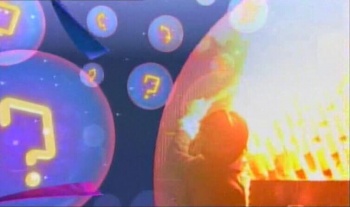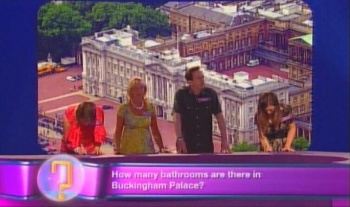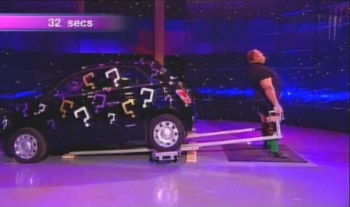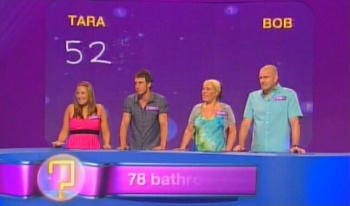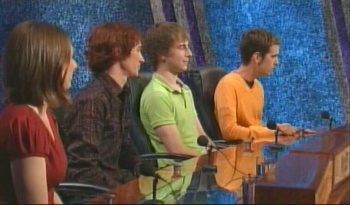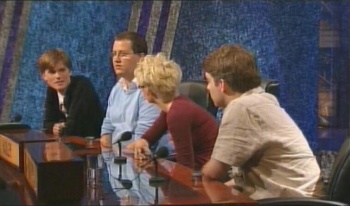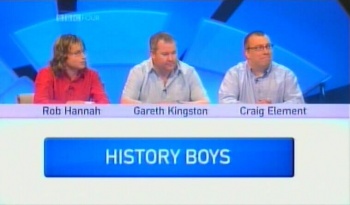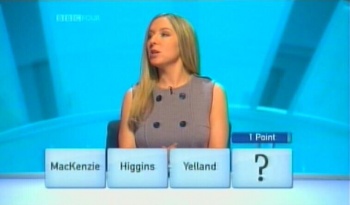Weaver's Week 2009-08-02
Last week | Weaver's Week Index | Next week
Contents |
Guesstimation
Endemol / Talpa for BBC1, Saturday evenings from 11 July
| In the week before Guesstimation first graced the nation's television screens, Teletext, the teletext service of the independent channels, wondered why there were so many dubious game shows tied in with the national lottery. Unusually, we agree with their opinion, but only up to a point. The Big Ticket was an object lesson in how not to make television, and Red Alert was almost as bad. Winning Lines has stood the test of time brilliantly, and both One Versus One Hundred and Who Dares Wins are amongst the greatest game shows currently in production. Readers might compare and contrast with ITV's 9.25 shows: for every Chain Letters there was a Jumble, every Win, Lose or Draw was counterpointed by Your Number Please, every Supermarket Sweep had (er) the first series of Supermarket Sweep.
Anyway, Guesstimation is hosted by Who Dares Wins and Last Choir Standing host Nick Knowles. It's played by two teams of four players, all sharing some sort of familial connection. The introductions struck us as rather long – they're only about four minutes combined, but those seem to be four very long minutes. One of the people is the appointed team captain, and they have a free pass to the final of each round. Before the final comes three preliminary rounds. In round one, each captain chooses two of the other people from their team; the other two will play in round two, and any two players can be selected for round three. A category emerges from a category board: in theory, these are related to the topic of the questions, but this linkage is often tenuous. | |
| Each preliminary round begins with two preliminary questions. For instance, "In 1985, Bob Geldof played to 72,000 people at the Live Aid concert. How many people attended his concert in Milan in 2008?" The four players are given ten seconds to write down their answers on those touch-screen thingummies first seen on Jeopardy! about twenty years ago. The first answer revealed is that of whoever's furthest away, so that the host can laugh at / with them. Only then is the correct answer revealed (in this example, 45) and then the person who was closest to the correct answer. For information purposes, and to confirm everything is above board, the last two answers are also shown.
Winning one of the preliminary questions allows the captain to nominate an extra person to join them in the final question of the round. This always takes the form of a physical stunt, performed on the Guesstimation Guesstistage. There's usually some sort of cross-promotion for another BBC programme (hello, people from Strictly Come Dancing) and always some sort of cross-promotion for athletes. That'll be people funded by The Lottery Corp.'s products, appearing on a programme promoting The Lottery Corp. Doesn't that present a mightily huge conflict of interest? | |
| Very possibly, but the programme continues on its merry way. The problem with these challenges is that they promise somewhat more than they deliver. Seeing some bloke breathe fire over candles to light them should have been a television spectacular, but it was presented as though it was an everyday occurrence, without so much as a slow-mo Guessti-replay. This aspect could be as gripping as You Bet!, but it's presented with all the panache of The Saturday Show. Anyway, each of these stunts carries a prediction that the guesstimators will see happen before their very eyes. As before, the worst guess then the best is revealed. The winner books a place for his or her team in the final round.
While Nick Knowles does his very best to make the show easy for the viewer to follow, we found it more complex than it needs to be. Two preliminary preliminary rounds before each preliminary final round, then three of these preliminary rounds before the final round. There is merit to the system, giving advantages to the best guesstimators without ensuring the final is entirely without point, but it's not that clear first time through. The line-up of guessers changes for almost every question, though here the viewer is helped by names appearing over the heads of people who are playing. Answers also appear over the competitors' heads, accompanied by a slightly twee starburst effect. | |
| Between the final preliminary round and the final round is inserted a commercial break for The Lottery Corp; in one episode we reviewed, it contained the unwelcome sight of Lord Sir Sebastian Coe promising that there's something for everyone in his spectacle of pompousness.
The final round is played by five people across the teams, and is a holiday to somewhere exotic. Winners could be off to hard-rock Helsinki, or walking the Southern Alps in Auckland, or going to the Beijing academy of advanced tank driving. Here, the questions all have some relevance to the destination city or country, and they're revealed with somewhat more fuss than is strictly necessary. Nick insists on saying that so-and-so is in the lead, and delaying the revelation of each answer for as long as possible. It's that final round that tilts our opinion. Guesstimation would work if it was fitting a half-hour or a 35-minute slot, a la Hole in the Wall. But at 43 minutes (excluding commercials), it's stretched out just that bit too long. There isn't room for a fourth preliminary round, but there is room to make the end-of-round spectaculars that little bit more spectacular. Actually, there's room to make them slightly spectacular: the moment when Martin Offiah is lifted off the ground by accumulated pints of milk was rushed and turned into an anticlimax. There's hope for the show – it's nowhere near as hideously contrived as This Time Tomorrow, or as pointless as Millionaire Manor – but neither is it an instant winner. |
In this week's Game Show Times, we asked, "What lies at the junction of the hall down Addison Road, the replacement for Fellows Park, a factory near Spango, and a company privatised in 1988; and why would The Post Office's cartoon bird lead you on the wrong lines?" Are you on the right track? The answer comes a little later.
University Challenge
Heat 4: Clare Cambridge v Jesus Oxford
| Word of the week is "cheek", and it goes to Clare Cambridge. Thumper spends most of the time telling us about the college's bizarre practice of insisting that people who lose at table football should run round the college courtyard in their undercrackers. People who (hopefully) didn't do this include the alumnus Peter Lilley MP (Conservative spokesman on Being Dead Silly. Or was that his brother Cuthbert?)
Jesus get under way with the next starter, and a set of bonuses of English words that, when suffixed with "shire", form Welsh counties. Clear? As mud, quite frankly. Jesus's history includes lots of stuff for the nobility, and the education of T E Lawrence (Arabia). The working on the question about how many countries there are on an overland route between the UK and China isn't shown: the question specified a route via Brussels, so it's France, B*lg**m, Germany, Poland, Russia, and thence to China. The visual round is on who has the best poker hand: our money's on Victoria Coren, she's the Monday night expert on such matters. Jesus don't do too well on these bonuses, much to the pleasure of their parents, and lead 75-10. | |
| Jesus prove that they know the derivation of "factoid", something that didn't exist before it was printed somewhere, and the Steve Wright show has been dishing them out since 1982. An impressive buzz from Matt Cliffe of Clare on a question asking to sum five prime numbers to find another, palindromic, prime. He goes on to get a set of bonuses on chemical compounds, single-handedly. We're pleased that Jesus got "Midnight train to Georgia" out in the end, they deserve it. The audio round asks for the composer of some classical music, no-one knows his, er, Mendelssohn, and Jesus leads by 110-55.
The audio bonuses are on composers marking anniversaries this year, and Jesus do know his Handel. Phew. A later starter question asks after Russian composers of the mid-20th century. If it's not Rachmaninov, surely Stravinsky's worth a punt. The second visual round is on the figure in a religious engraving, and it keeps Clare in the hunt for tonight's win; they've trailed since the second starter, but 150-100 is just retrievable. | |
| They can't let more than one starter go, really, and the first starter of the final section is dropped by both sides, then Jesus gets the next one. When the Oxford side proves they know their Bolivian attractions, and get all the bonuses, we're writing "game over" in our notebook. Clare do get a set of bonuses, anagrams of chemical elements, for instance the comic characters "broon" turn into "boron". How is anyone supposed to work out that 11 days 14 hours is a million seconds? Clare do their best to boost themselves up the repechage board; we can't see UCL's 175 or Christ's 170 being insufficient, and 140 – as the side had for much of the last few minutes – looks plausible but no better for the other places. Those last bonuses could prove crucial, as at the gong, Jesus has won, 215-165.
Captain Tom Hegarty led the way for Clare, with five starters; his team made 15/27 bonuses, recovering well in the final few minutes. Tom Speller was the best buzzer for Jesus Oxford, nine starters as the side made 19/36 bonuses. There were no missignals in the entire show. Next match: Nottingham v Girton Cambridge | Repechage standings:
|
Only Connect
Series 2, Episode 3: Rugby Boys v History Boys
| "We don't confuse Bono with de Bono on this show," claims host Victoria Coren. Yes, we know Mr de Bono paid his taxes in full. Tonight, the History Boys all have degrees in history, while the Rugby Boys are all members of a rugby club, but they're also good at quizzing. In the months since this show was recorded, Mark Labbett from the Rugby Boys has turned professional, taking part in The Chase.
It's obvious to the History Boys that the first set of four are foods, but not so obvious that they're all restricted to a geographic area; two points. The Rugby Boys respond with last lines from films, and get a remarkable three points. Game on! Ninth symphonies evade both teams, but the Rugby team dodge a bullet with rose and a leopard, they think it's all that rugby, but it's not. Rugby pick up literal translations of German words, and lead by 7-2 at the end of the round. | |
| Interior angles of regular polygons goes on a bonus to the Rugby team, who also know their way around a Roman bath house, ending in a frigidarium. Cool. History know what to do with sprained ankles: rest, ice, gives them three points. Rugby get descriptions on a standard barometer, but zag with "storm" when it's "rain". History start humming "My favourite things", and are ashamed to receive three points. Don't knock it, sir! Rugby confuse waterways of Canada with editors of The Sun. Easily done, but their lead has been reduced to 11-8.
The Rugby Boys are first into the walls, and begin with types of heels and young animals, then before confirming their ER doctors, spend a few moments sorting out the fourth group. That's confidence, and a well-deserved ten points. In response the History Boys spot four Hungarians, then get some moustaches. With time running down, they have to take a guess on something; they were looking for styles of skirt, and pig___ words. It's five points in total, putting the Rugby Boys ahead by 21-13. Scores can go down as well as up in the Mssng Vls round, which begins with "They have US states in their name"; it ends 2-1 to rugby. John Steinbeck books is 2-0 to rugby, stock market terminology a 1-1 draw. Terms for heaven is more to the historians' favour, getting the first two answers, but a drop means it ends 2-1 to rugby. Ice-skating moves goes 1-0 to history, all of which means the Rugby Boys have won, 28-17. A team in purple has won, and from this performance, they have to be warm favourites to win the whole thing. And we've not even seen their next opponents! |
This Week And Next
Starting with the RBQ question. The hall down Addison Road is the Olympia exhibition hall in Kensington, while Fellows Park was the home of Walsall FC until it moved to the new Bescot Stadium. The factory near Spango was owned by IBM, and British Steel was the one privatisation in 1988. Kensington Olympia, Bescot Stadium, IBM Halt, and British Steel (Redcar) are all railway stations named, or re-named, after commercial entities.
One matter left hanging from the Guesstimation review: according to the show, Buckingham Palace has 78 bathrooms.
Questions have been asked after one of the contestants from this year's Big Brother was admitted to hospital. The contestant is believed to have inflicted some harm on himself after viewing footage of his removal from the show. The usual battle lines were drawn: Channel 4 repeated the mantra that contestants' welfare is of "paramount importance"; a representative of a mental health charity questionned what was actually offered by the producers.
Ratings figures for the week to 19 July demonstrate that Guesstimation was the most popular show, pulling 4.95m viewers. ITV's maybe-game show Anonymous had 3.85m interested, Millionaire had 3.6m, and Dragons' Den returned with 3.2m. 8 Out of 10 Cats had a year's best 2.95m, but still finished just behind Big Brother.
A slight change on the digital channels: Come Dine With Me just beat a million listeners, but QI on Dave moved ahead of Britain's Got Talent Us on ITV2. Big Brother's Big Mouth had almost half-a-million, Four Weddings on Living had 340,000, and a very warm welcome to Only Connect. BBC4's biggest television quiz involving connections and hosted by Victoria Coren had 270,000 viewers, instantly beating CBBC's Trapped (210,000).
Great news! Panic Attack, our favourite new quiz show of last year (with the exception of Only Connect, and maybe Duel) is replacing The Weakest Link (BBC1, 5.15 weekdays). Rotten news! That's only for viewers in Northern Ireland, who are getting all the luck at the moment and no mistake. Elsewhere, Clive Anderson's on The Funny Side of TV Talent (BBC2, 9.30 Thursday), and he's on Challenge for their new summer signing Back in the Day (6pm weekdays).
To have Weaver's Week emailed to you on publication day, receive our exclusive TV roundup of the game shows in the week ahead, and chat to other ukgameshows.com readers sign up to our Yahoo! Group.

